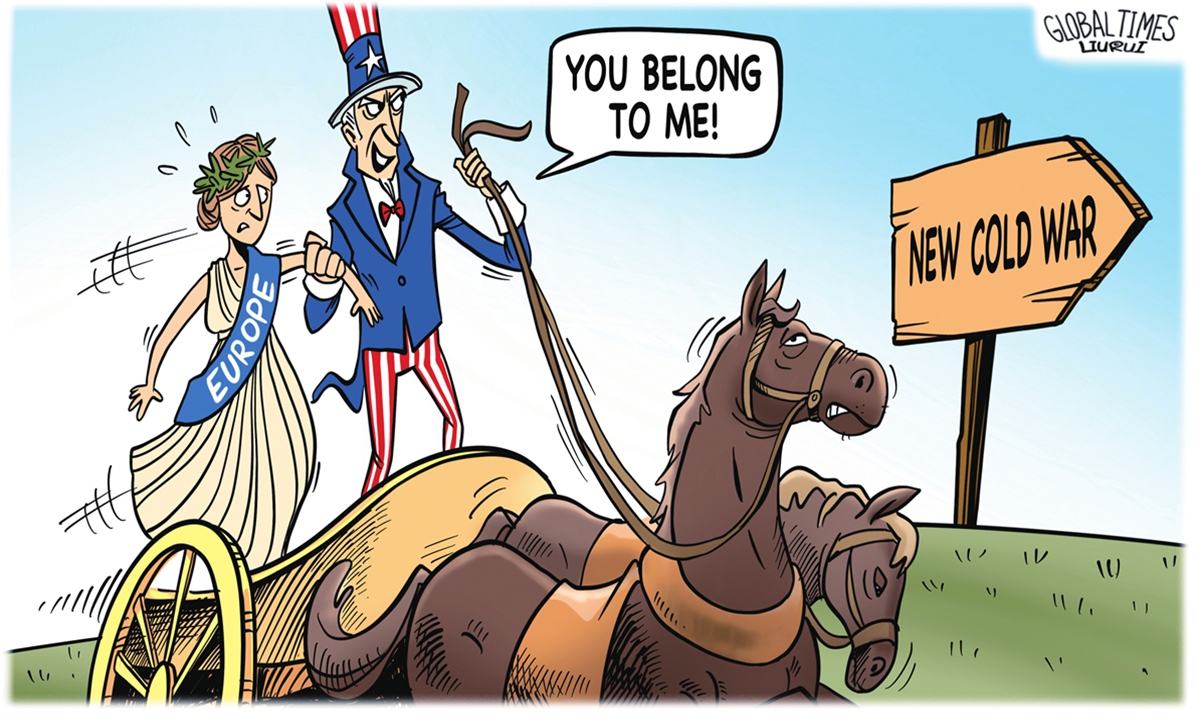
Illustration: Liu Rui/GT
The EU, being troubled by multiple crises, is now standing at a critical juncture with a question awaiting its answer - Where do its interests lie?
The EU should treat China even more as a competitor, EU foreign policy chief Josep Borrell said on Monday, Reuters reported. He made the comment as EU leaders are set to discuss ties with China at a two-day summit from Thursday, starting a process that officials have described as a "fine-tuning" of relations between the two sides.
Since 2019, China has been referred to as a partner, economic competitor and systemic rival. Borrell said on Monday that the role of competitor had become more central.
"Fine-tuning"? How? Policy adjustment is supposed to be based on a country's or a group's own interests. Where do the EU's interests lie? In Europe, in the EU's member states.
Unfortunately, the EU's China strategy has been increasingly influenced by the US over the past years. Political principles, instead of practical interests, have overwhelmed economic rules, and security logic has replaced market laws. As a result, the previous win-win China-EU ties based on mutual benefits is dragged into a zero-sum mentality, Cui Hongjian, director of the Department of European Studies at the China Institute of International Studies, told the Global Times.
When the EU's interests are touched upon nowadays, ranging from the group's strategic autonomy to people's livelihoods, cooperation with China can bring benefits, ease ongoing crises and help solve some puzzles.
Take the energy crisis. Bilateral trade is now witnessing a small boom in exports of Chinese electric blankets to Europe as Europeans are uncertain whether they can weather a winter under the shadow of the worsening energy shortage. More importantly, the two sides have big room in boosting cooperation in energy transition and revolution. China is the leading country in power generation from renewable energy sources. Its share in all the manufacturing stages of solar panels (such as polysilicon, ingots, wafers, cells and modules) exceeds 80 percent, according to the International Energy Agency. In terms of global governance, including climate control, anti-terrorism and nuclear nonproliferation, China and the EU share highly identical stances.
Trade is essential to the EU. In the first eight months of 2022, total trade volume between China and the EU was $575.22 billion, up by 8.8 percent year-on-year. The EU's investment in China was $7.45 billion, up by 121.5 percent year-on-year.
On the other hand, Washington, which Brussels is following closely, has been eroding the interests of the EU. "The 'America First' is not just about US own interests, but also about US global leadership." Yang Xiyu, a senior research fellow at the China Institute of International Studies, told the Global Times. In other words, Yang noted, it is not China, but the US hegemony, that conflicts with the EU's interests.
Some Europeans have taken notice of it. That's why former German chancellor Angela Merkel insisted on promoting the Nord Stream II pipeline project despite US pressure. In 2020, then German foreign minister Heiko Maas said, "It remains our sovereign decision where we get our energy from."
At that time, European leaders understood the very simple truth - Be it Russia or China, as long as a country has complementary advantages in cooperation, the potential of their cooperation with the EU of bringing mutually beneficial achievements could be huge. But today's EU has been kidnapped by the so-called political correctness, and worse, their "politically correct" choices are coming back to haunt them.
It was only a few days ago when Borrell said that China "provided the basis of our prosperity." If European politicians are willing to let go of their politically tinted glasses, this sentence can still hold true today as well as in the future. "We need China to win and prosper," this is what Jörg Wuttke, president of the EU Chamber of Commerce in China, told the Global Times in an interview in September.
To build a sound China-EU relationship, Yang made two suggestions. To begin with, China and the EU need to promote their strategy transparency. When the EU regards China as a systematic rival and growingly shows tougher stance toward China, the US' incitement plays a major role, but it also mirrors the EU's strategic misjudgment of China's peaceful development. On the other hand, China needs to figure out whether the EU is attempting to Westernize or divide China. "At this point, we must not be afraid of exchanging views on sensitive topics," Yang said.
Second, the two should find more common grounds and overlapping fields where both sides want to promote cooperation. The process can start from sectors with low sensitivity, and gradually move toward a more complete industrial chain one step at a time.
Meanwhile, don't forget China is also a staunch supporter of European autonomy. European leaders have been proposing the future European development direction, such as the enlargement of the EU, a European security regime, and European Political Community, which might not be necessarily mature, but are explorations to avoid losing their autonomy.
After all, the EU belongs to Europeans, not to the US.




